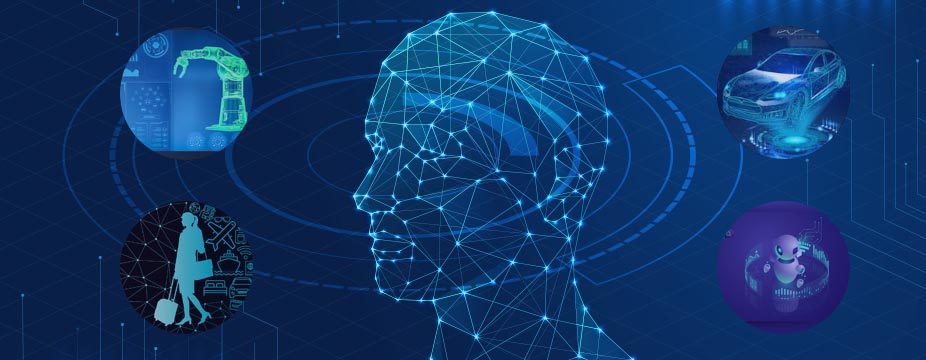|
Getting your Trinity Audio player ready...
|
Deep Learning industry applications have made headway in solving automatic recognition of patterns in data, which surpassed human beings. In the last five years, deep learning solved the limitations of traditional machine learning algorithms. During its growth period, it caught the eye of businesses and everyone has the desire to make use of it. But even for highly trained professionals, it is hard to explore and define where to start and implement a deep learning model to solve their problems.
Deep Learning is evolving as one of the crucial practices in industries like manufacturing, hospitality, digital assistants (IoT), automotive, etc. With the increased use of machine learning, industries are leveraging their applications to be part of Industry 4.0. In this article, we discuss the top industry applications of deep learning and their business implementations.
Which Applications of Deep Learning Transform Major Industries?
1. Computer Vision enabled product malfunction detection.
2. Image recognition and NLP-based language recognition and translation.
3. Reinforcement learning helps the machine in a legitimate learning process.
4. With Neural networks, it helps in cognitive computing.
5. Sentiment analysis of consumers.
6. Helps in building humanoid robots.
7. Digital assistants.
Deep Learning Industry Applications
Automobiles:
According to Google, the 4th largest industry in the world is the Automobile Industry. Being AI-driven, it has increased by 9.5% in the last 2 years. The traditional automotive-making practitioners in the US have faced slow growth of 0.3% from 2017. With the advanced technology application, automotive manufacturers are automating the infrastructure of vehicles from design dynamics to the advanced infotainment system. The self-driving cars (Tesla X), Google Waymo, and self-driving trucks ( Bharat Benz), etc. are live examples of automobiles using applications of deep learning.
As an example, with the installation of AI systems and deep learning technologies, the automated driver assistance system provides support in driving and when the driver’s concentration is misguided, the robust deep layer of the vehicle acts similarly to human senses and automatically assists to avoid a mishap.
Digital Assistants: ( voice search assistants)
It is one of the common applications that are used today. Like Siri for Apple, Alexa for Amazon, Hey Google and Google Home of Google Inc, and Contra by Microsoft. These virtual assistants are removing the barriers to communication and helping in better interactions.
Using Deep Learning techniques and neural network transformations, voice assistants are evolving from voice search assistants to Digital Assistants. Communication at the fingertips is driving the world of business with ease. UK-based Juniper Research Firm forecasted that the usage of digital voice assistants will reach 8 billion by 2023. According to the Google source report, the installation of digital assistants in business reached 2.5 billion at the end of 2018.
Example: The transformation of Amazon Alexa to Amazon Echo.
Amazon Echo can operate devices connected through IoT by a voice search.
Hospitality:
The hospitality industry is a multi-billion industry with a complex ecosystem with multiple functions. The adoption of new technology and industry up-gradation can drive day-to-day operations with ease.
Customer experience and satisfaction are key factors for industry growth. Deep Learning applications can provide retention and 100% assured customer satisfaction with innovative and intelligent strategies for changing market environments. The staff training time can be reduced by implementing VR projected training sessions during the course period of the employees. Deep Learning helps in forecasting services like:
– Developing customer strategy
– Competitive Pricing
– Predicting seasonal demands and services
– Personalized recommendations
– Customer service and satisfaction index
Manufacturing:
Smart Manufacturing & Industry 4.0 are the terms that we can relate to the usage of Deep Learning in the Manufacturing industry.
What is Smart Manufacturing? The process of using advanced analytical tools and Deep Learning techniques, to provide diagnostic research in forecasting the future volumes of sale, strategies to decrease the cost of production, production time, and Manufacturing quality goods within the required quantity. Deep Learning tools can forecast the product life cycle of different products that are manufactured.
The detection of faulty products has been a tremendous job in the production process. For instance, if the same task is assigned to a machine, it will increase the quality time by reducing the cost of production.
Evolving branches of deep learning unfold new usages for every industry. By leveraging this technology, industries are adapting and changing their applications for being future untended. Understanding and interpreting consumer and supplier needs for every company became an essay process by which the cost of expenditure of the company decreased gradually. With the ability to self-learn through reinforcement learning, the deep learning models help businesses in computation and prototype designing much faster than the normal time consuming. The real-world applications include text recognition, image and face recognition, customer research, aeronautical science applications, medical research, and computer vision.
If you need any help with idea validation, proof-of-concept, Data Science consulting, large-scale AI implementation, Big Data Engineering, or a creative solution for your
If you need any help with idea validation, proof-of-concept, Data Science consulting, large-scale AI implementation, Big Data Engineering, or a creative solution for your product. You are at the right place.
Talk to our experts
